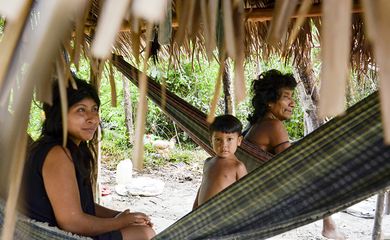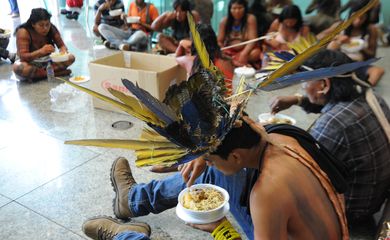Indigenous association signs first agreement to receive investment


Environment Minister Izabella Teixeira, Biodiversity Secretary Ana Cristina Barros, and the Ashaninka representative, Francisco Piyãko, during the announcement of the grant for the indigenous community 

The National Bank for Economic and Social Development (BNDES) signed on Wednesday (Apr. 22) an unprecedented financing agreement directly with an indigenous association. The agreement will benefit a project for the Upper Juruá, run by the native Ashaninka people who live on the Acre state border with Peru, in the Brazilian Amazon. The indigenous community will be provided with $2.19 million from the Amazon Fund to promote sustainability and help protect the Amazon rainforest, in their own territory and the vicinity. Another indigenous organization, the Association for Forest Protection, applied for the grant and was awarded with $2.29 million from the bank.
The resources directly devoted to the indigenous people are from the bank's Amazon Fund. Considering the agreement signed with the Ashaninka people, the fund totals $29.25 million. A new application process which has already awarded a further three projects will provide an additional $22.03 million in funds. Out of a total combined $51.28 million, $4.47 million will be managed directly by native communities.

Henrique Paim
The Amazon Fund was created in 2008 for the purpose of raising donations for non-refundable investment in preventing, monitoring and combating deforestation, and promoting conservation and sustainable use of Amazon forests. According to the BNDES Head of Social Infrastructure, Environment, Agriculture and Social Inclusion, Henrique Paim, the fund covers 20% of the projects' needs and 10% of the funds in the bank's portfolio. Most of the resources is awarded to environmental and indigenous causes. Applications from universities and government agencies are also accepted.
According to the chairman of the National Foundation for Indigenous People (FUNAI), Flávio de Azevedo, the latest selection revealed that the indigenous causes are playing a more active and prominent role, with more project entries. “Many proposals were not so successful due to [issues with] technical details, but they did show more initiative, which shows the communities are stronger and increasingly empowered to take the reins in the future.”
The Ashaninka representative, Francisco Piyãko, said the resources are crucial for those who struggle to protect the forest. “This agreement is going to catapult a project that we are already working on involving land management and sustainable development, which aims to empower [our] communities and even maintain dialogue with other traditional communities nearby,” he said. According to Piyãko, at least 12,000 people will benefit directly, including 1,500 native people and 50 extractive communities.
The signing ceremony took place in the Ministry of Environment. On that occasion, the result of the first application phase for the Amazon Fund to support the National Policy for Environmental Management in Indigenous Territories was announced. In all, eight proposals were selected, one of which is managed directly by the indigenous community, the Kayapó Association for Forest Protection in the state of Pará.
The latest grant will also benefit a number of Kanindé indigenous organizations. The funds will be used to support sustainable productive activities, environmental recovery of degraded areas, and the implementation of solid waste management initiatives, in addition to producing solar energy on Indigenous land.
The proposals are reported by the Environment Ministry to cover 40 indigenous territories and about 44% of the Amazon forest reserves. According to Minister Izabella Teixeira, indigenous territories are central for preservation. In the Brazilian Amazon there are 324 indigenous lands. “We are convinced that the [best] way to fight deforestation is through these actors,” she pointed out.
The representative of the Alliance of Indigenous Organizations of the Brazilian Amazon, Toya Manchineri, stressed the need to expand the initiative to indigenous communities elsewhere in the country. “As the environmental policy is effectively implemented, [it] will help empower indigenous people in their territories. If it could be expanded, this would open the door for more resources to go to other areas in the Central-West, the Northeast, the South.”
Translated by Mayra Borges
Fonte: Indigenous association signs first agreement to receive investment



